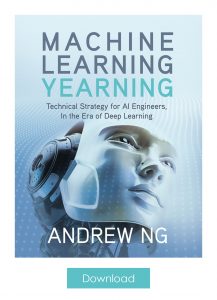We’re all familiar with artificial intelligence (AI) and its applications around us. Knowingly or unknowingly, many of us use some form of artificial intelligence in our daily lives. It is slowly getting integrated with everything around us, be it your YouTube video suggestions or a Humanoid. So, this is an ideal time to better understand “artificial intelligence” and associated topics.
Since the future is going to be dominated by AI, ML, computer vision, NLU, NLP, etc., even young learners today need to understand the concept better. With the right knowledge, not just kids, but even working professionals interested in studying or working on AI and its implementations can become better equipped.
We have many videos and websites with diverse information on AI, but here we have curated a list of books to help you learn more about AI.
The Master Algorithm
“How the Quest for the Ultimate Learning Machine Will Remake Our World”
Pedro Domingos’ “The Master Algorithm” features a great history and insight into machine learning and artificial intelligence for a non-technical or non-expert reader.
This book assists the reader in understanding the different algorithmic approaches to data and computer learning and intelligence, as well as the advantages and limitations of each algorithmic approach. It also helps to develop ideas and concepts around what is necessary for computers to exhibit human intelligence, which is far more complicated than most people realize.
The book has a 4.4 rating with over 800 reviews on both amazon. in and amazon.com.
Here is a quick look at the content:
Chapter 1 — The Machine-Learning Revolution
Chapter 2 — The Master Algorithm
Chapter 3 — Hume’s Problem of Induction
Chapter 4 — How Does Your Brain Learn?
Chapter 5 — Evolution: Nature’s Learning Algorithm
Chapter 6 — In the Church of the Reverend Bayes
Chapter 7 — You Are What You Resemble
Chapter 8 — Learning Without a Teacher
Chapter 9 — The Pieces of the Puzzle Fall into Place
Chapter 10 — This Is the World on Machine Learning Epilogue

About the Author – Pedro Domingos
Leading AI researcher Pedro Domingos is the author of “The Master Algorithm,” an introduction to machine learning that has become an international hit. At Seattle’s University of Washington, Pedro teaches computer science. He is a fellow of AAAS and AAAI and the recipient of the SIGKDD Innovation Award and the IJCAI John McCarthy Award, two of the top accolades in data science and AI. He is a widely sought-after speaker and has written for publications such as the Wall Street Journal, Scientific American, Wired, and others.
The Book of Why
Written by Judeo Pearl, The Book of Why is a unique companion to other works on artificial intelligence. It is unique as it presents an overview of causality and concepts related to cause and effect.
As the well-known proverb says, correlation is not causality, and you will understand why after reading this book.
The book is also highly informative and unique in its discussions of the shortcomings of modern AI, machine learning and other advanced analytical techniques concerning causality.
This is an excellent book to broaden your knowledge beyond predictive and prescriptive analytics to the vital world of causality.
“The Book of Why” has a 4.4 rating with over 1500 reviews on amazon.in and amazon.com.
Here is a quick look at the content:
Chapter 1— The Ladder of Causation
Chapter 2— From Buccaneers to Guinea Pigs: The Genesis of Causal Inference
Chapter 3— From Evidence to Causes: Reverend Bayes meets Mr Holmes
Chapter 4— Confounding and Deconfounding, or, Slaying the Lurking Variable
Chapter 5— The Smoke-filled Debate: Clearing the Air
Chapter 6— Paradoxes Galore
Chapter 7— Beyond Adjustment: The Conquest of Mount Intervention
Chapter 8— Counterfactuals: Mining worlds that could have been
Chapter 9— Mediation: The Search for Mechanism
Chapter 10— Big Data, Artificial Intelligence and the Big Questions
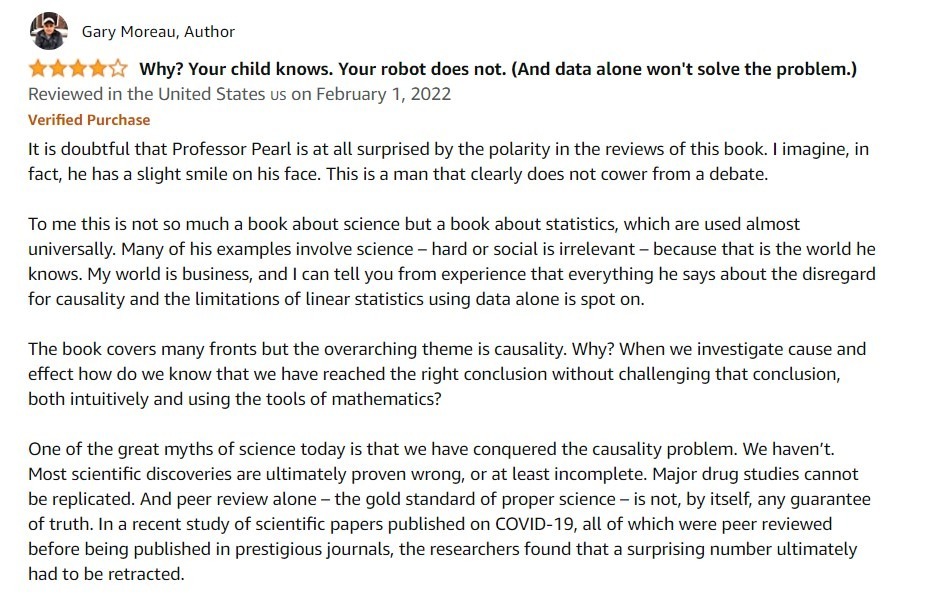
About the Authors – Judea Pearl & Dana Mackenzie
Judea Pearl is an Israeli American computer scientist and philosopher best known for supporting the development of Bayesian networks and the probabilistic approach to artificial intelligence.
Dana Mackenzie always dreamed of being a writer when he was a kid. At age five, he published his first book, “The Littlest Inchwarm.” He produced 101 reports in fourth grade when each pupil was required to write two during the year (making liberal use of the Encyclopedia Britannica).
The Hundred-Page Machine Learning Book
Andriy Burkov’s book “Hundred-Page Machine Learning” offers an excellent overview of machine learning explicitly designed for practitioners. The book covers most of the areas a practitioner should know and includes a suitable amount of theory and mathematics without being overly technical or mathematically rigorous. This is a must-book for AI practitioners. It would benefit non-practitioners, too; they can dive deeper into all aspects of machine learning.
The book has a 4.4 rating with over 200 reviews on amazon.com and 4.6 ratings on amazon. in with 900+ reviews.
Here’s a quick look at the contents:
Chapter 1— Introduction
Chapter 2 — Notation and Definitions
Chapter 3 — Fundamental Algorithms
Chapter 4 — Anatomy of a Learning Algorithm
Chapter 5 — Basic Practice (Level 1 Machine Learning)
Chapter 6 — Neural Networks and Deep Learning
Chapter 7 — Problems and Solutions
Chapter 8 — Advanced Practice
Chapter 9 — Unsupervised Learning
Chapter 10 — DBSCAN and HDBSCAN
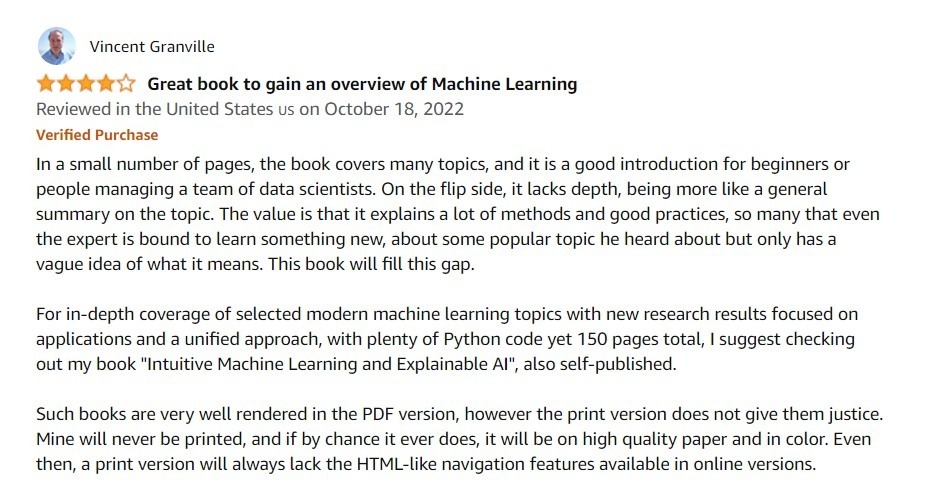
About the Author – Andriy Burkov
In Quebec City, Canada, Andriy Burkov works as a machine learning specialist. He earned his doctorate in artificial intelligence eleven years ago, and for the past eight years, he has been in charge of a group of machine learning engineers at Gartner.
The study of natural language is his area of expertise. His team uses shallow learning and deep learning techniques to develop cutting-edge multilingual text extraction and normalization systems for production.
Machine Learning Yearning
Andrew Ng’s Machine Learning Yearning is an excellent textbook for practitioners. It is similar to “The Hundred-Page Machine Learning Book” in its comprehensive coverage of machine learning and its application to AI but is written more in a comment-to style.
The book is also written in a logical order that closely mimics the typical process that a data scientist or machine learning engineer would follow when working on an end-to-end machine learning project, along with discussing key considerations and trade-offs.
The book has 4.3 ratings with over 40 reviews on Goodreads.com.
Here’s a quick look at some of its content:
Chapter 1 — Why Machine Learning Strategy
Chapter 2 — How to use this book to help your team
Chapter 3 — Prerequisites and Notation
Chapter 4 — Scale drives machine learning progress
Chapter 5 — Your development and test sets
Chapter 6 — Your dev and test sets should come from the same distribution
Chapter 7 — How large do the dev/test sets need to be?
Chapter 8 — Establish a single-number evaluation metric for your team to optimize
Chapter 9 — Optimizing and satisficing metrics
Chapter 10 — Having a dev set and metric speeds up iterations
About the Author – Andrew Ng
Dr. Andrew Ng is a well-known expert in AI (Artificial Intelligence). He is the Chairman and Co-Founder of Coursera, the Founder of Deep Learning.AI, the CEO of Landing AI, General Partner at AI Fund, and an Adjunct Professor at Stanford University’s Department of Computer Science.
Dr. Ng is a pioneer in the disciplines of machine learning and online education. He has written or co-authored over 200 academic articles on robotics, machine learning, and related topics. He was included in the Time 100 list of the world’s most important people in 2013.
Deep Learning
Deep Learning is an excellent book on neural networks and deep learning that provides significant technical rigour around these subjects. It is an introduction to a broad range of topics in deep learning, covering mathematical and conceptual background, deep learning techniques used in industry, and research perspectives. Authored by Ian Goodfellow, Aaron Courville and Yoshua Bengio, it aims primarily at university students and software engineers looking to learn more about machine learning and artificial intelligence.
“Deep Learning” has an amazon.com rating of 4.3 with over 1900 reviews and amazon.in rating of 4.6 with over 1800 reviews.
Here’s a quick look at some of its content:
Chapter 1 — Introduction
Chapter 2 — Linear Algebra
Chapter 3 — Probability and Information Theory
Chapter 4 — Numerical Computation
Chapter 5— Machine Learning Basics
Chapter 6 — Deep Feedforward Networks
Chapter 7 — Regularization of Deep Learning
Chapter 8 — Optimization for Training Deep Learning Models
Chapter 9— Convolutional Networks
Chapter 10— Sequencing Modelling: Recurrent and Recursive Nets

About the Authors – Ian Goodfellow, Auron Courville & Yoshua Bengio
Ian Goodfellow is a research scientist at OpenAI. He is the creator of generative adversarial networks and other machine-learning methods. “TensorFlow” and “Theano” are only two examples of open-source machine learning programs to which he has contributed.
Auron Courville is an associate professor at the Université de Montréal’s Department of Computer Science and Operations Research (DIRO). The Robotics Institute at Carnegie Mellon University is where he obtained his PhD. In addition to being a fellow of the CIFAR program on Learning in Machines and Brains, he is a founding member of Mila. He co-authored the groundbreaking text on “Deep Learning” with Ian Goodfellow and Yoshua Bengio.
Yoshua Bengio, one of the foremost authorities on artificial intelligence, won the 2018 A.M. Turing Award—known as the “Nobel Prize of Computing”—alongside Geoffrey Hinton and Yann LeCun for his groundbreaking work in “Deep Learning.”
He founded Mila, the Quebec AI Institute, and serves as its Scientific Director. He is a Professor at the University of Montréal. He serves as the Scientific Director of IVADO and co-directs the CIFAR Learning in Machines & Brains initiative as a Senior Fellow.
Genius Makers
“The Mavericks Who Brought AI to Google, Facebook, and the World”
Cade Met’s “Genius Makers” is a very readable account of the history of AI as a field and how Facebook’s technology leaders, Google, and an array of companies and universities have transformed AI from a niche technology into a world-changing reality.
The book has a rating of 4.5 and 4.6, with nearly 400 reviews on amazon.in and amazon.com, respectively.
Here’s a quick look at its content:
Part One — A new kind of machine
Part Two — Who Owns Intelligence?
Part Three — Turmoil
Part Four — Humans are Underrated
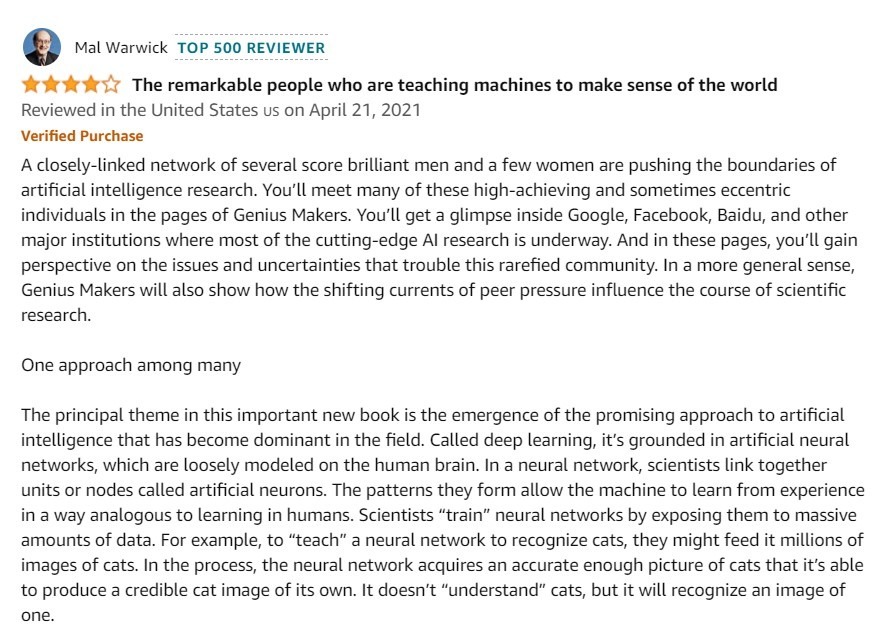
About the Author – Cade Metz
Cade Metz, a technology correspondent at the New York Times, covers emerging technologies such as robotics, virtual reality, autonomous automobiles, and artificial intelligence. He had previously worked as a senior staff writer at Wired magazine.
Prediction Machines
“The Simple Economics of Artificial Intelligence”
Written by three economists, Ajay Agrawal, Joshua Gans and Avi Goldfarb, “Prediction Machines” talks about how the AI economy will transform “the company” as we know it. In doing so, it offers practical advice on how to develop technology-related strategies and business plans.
It has a rating of 4.5 and over 500 reviews on both amazon.in and amazon.com.
Here’s a quick look at some of its content:
Chapter 1 — Introduction
Chapter 2 — Cheap Changes Everything
Part One: Prediction
Chapter 3 — Prediction Machine Magic
Chapter 4 — Why It’s Called Intelligence?
Chapter 5 — Data Is the New Oil
Chapter 6 — The New Division of Labor
Part Two: Decision Making
Chapter 7 — Unpacking Decisions
Chapter 8 — The Value of Judgment
Chapter 9 — Predicting Judgment
Chapter 10 — Taming Complexity
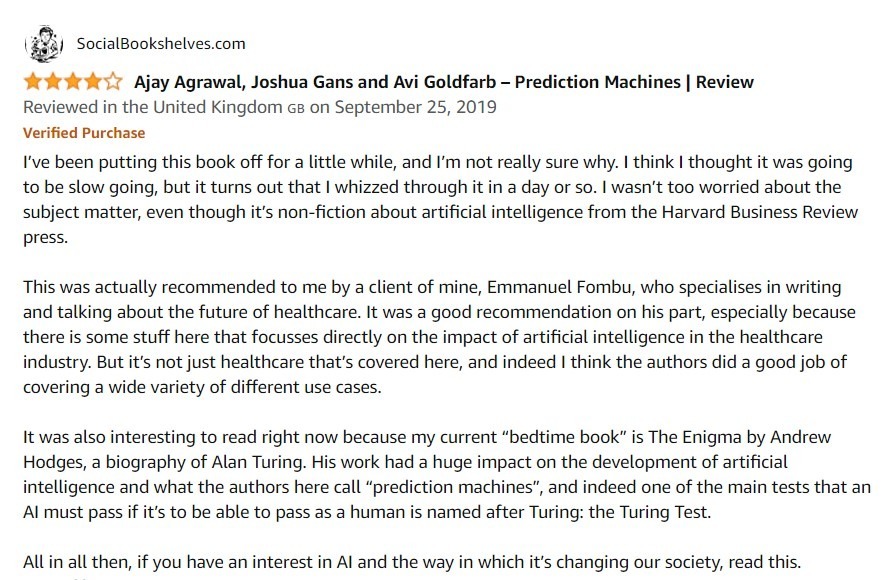
About the Authors – Ajay Agrawal, Joshua Gans & Avi Goldfarb
Ajay Agrawal holds the “Geoffrey Taber Chair in Entrepreneurship and Innovation” and is a Professor of Strategic Management at the Rotman School of Management at the University of Toronto. In 2010, Agrawal co-founded NEXT Canada, formerly known as “The Next 36.”
Joshua Gans teaches strategic management and holds the “Jeffrey S. Skoll Chair of Technical Innovation and Entrepreneurship” at the Rotman School of Management, the University of Toronto (with a cross-appointment in the Department of Economics). He served as the strategic management area coordinator from 2013 to 2019. Before 2011, he served as the founding professor of management (information economics) at the University of Melbourne’s – Melbourne Business School. He also worked as a guest researcher at Microsoft Research in 2011. Joshua holds an honours economics degree from the University of Queensland and a PhD from Stanford University.
Avi Goldfarb, a professor of marketing at the University of Toronto’s Rotman School of Management, holds the “Rotman Chair in Artificial Intelligence and Healthcare”. He is also a Senior Editor at Marketing Science, the Chief Data Scientist at the Creative Destruction Lab, and a Research Associate at the National Bureau of Economic Research. The opportunities and difficulties of the digital economy are the main subjects of Avi’s research.
You Look Like a Thing, and I Love You
“How Artificial Intelligence Works and Why It’s Making the World a Weirder Place”
Authored by Janelle Shane takes a funny and informative journey through the world of AI by running experiments that test the limits of what AI can and can’t often do hilariously (like having AI truly botch new ice cream flavours). In the process, you’ll come away with a proper understanding of how AI works. The book makes artificial intelligence and machine learning both approachable and entertaining by using cartoons and humorous pop-culture experiments to look inside the minds of the algorithms that run our world.
The book has a rating of 4.6 with more than 500 reviews on both amazon.in and amazon.com.
Here’s a quick look at its content:
Introduction: AI is everywhere
Chapter 1— What is AI?
Chapter 2 — AI is everywhere, but where is it exactly?
Chapter 3 — How does it actually learn?
Chapter 4 — It’s trying!
Chapter 5 — What are you really asking for?
Chapter 6 — Hacking the Matrix, or AI finds a way
Chapter 7 — Unfortunate shortcuts
Chapter 8 — Is an AI brain like a human brain?
Chapter 9 — Human bots (where can you not expect to see AI?
Chapter 10 — A human-AI partnership
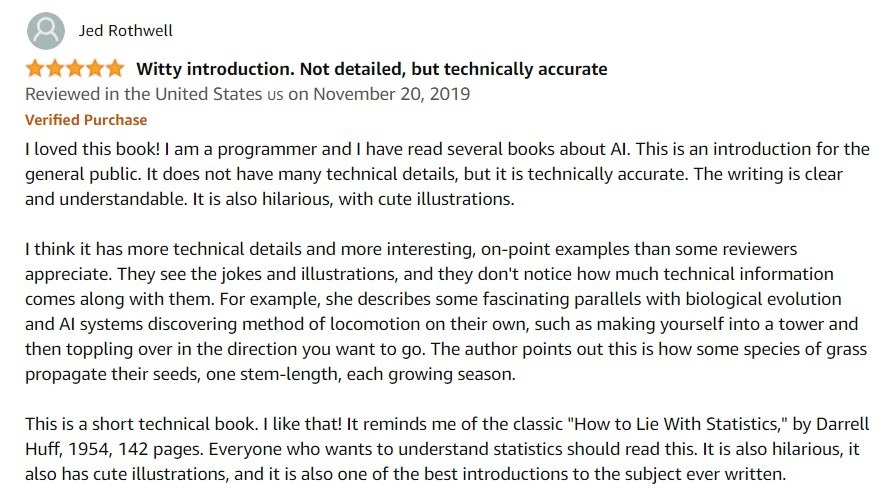
About the Author – Janelle Shane
Janelle Shane is an artificial intelligence researcher, optics scientist, author, and public speaker. She runs an artificial intelligence humour blog, AIweirdness.com, which explores the unusual aspects of AI. The New York Times, The Atlantic, WIRED, Popular Science, All Things Considered, and Slate have highlighted her. She has only ever attempted a neural network-written recipe once and found that the results were about as appalling as you might expect.
If you are curious to know AI, give these books a try. I hope this list helps you pick a book that suits your needs. Stay tuned for more such posts.

